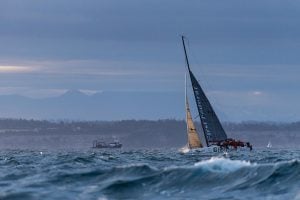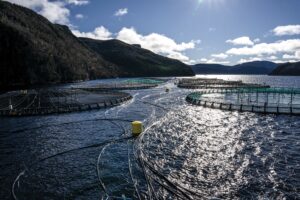
Exploration
Surviving the Race to Alaska
This motor-free ocean race — with vessels ranging from paddleboards to pedal-assist sailboats — is less about how fast you can go and more about whether you get there at all
- 3522 words
- 15 minutes
This article is over 5 years old and may contain outdated information.
People & Culture

Riding on a water nymph-named boat through the graveyard of the Pacific only to lose a prestigious international sailing race may not sound like fun to most Calgarians.
But Owen Thistle jumped at the chance to compete in last year’s Van Isle 360 International Yacht Race.
“It’s one of those bucket-list-type races,” he says. “If you had to pick a way to tour Vancouver Island, it’s got to be one of the best.”
Thistle was the skipper onboard the performance cruising boat Kerkyra, named after Corfu in Greece, as well as the water nymph Korkira in mythology. His crew was made up of friends almost completely from Calgary, with the exception of one member who recently moved to Victoria.
Together, the crew raced counterclockwise around Vancouver Island for 10 days last June. There’s no specific route for the competition, allowing sailing crews to strategize and choose their course, hoping to reach the finish line first.
“It’s not just an open water race,” Thistle says. “You’re working your way through a maze of channels and funny winds.”
Thistle says that on the east side of the island, the wind and currents vary a lot. “You pass around an island or into another channel, and the winds change direction.”
On the west side, Thistle says the difficulty is that the race is in the open ocean, where winds get strong. But at times, the weather was pretty calm. “You could have been water skiing, it was so flat.”
When winds are light and waters calm, it can be a challenge to figure out how to move the sailboat forward. “You’re in a race, so you have to try to make use of every bit of wind you get, turn the boat properly and keep thinking.”
But for Thistle, the most memorable moment of the race wasn’t the excitement of strategizing how to win – it was just trying to keep from capsizing.
He recalls a night near the end of the race when his boat was coming through the race rocks towards Victoria, traditionally “a bit of a dicey stretch.” Thistle says that at 2 a.m., all hands were on deck, trying to reduce the main sail, which was jammed.
“We had people lined up on the boom. Everyone was trying to figure out how to solve the problem as we were slowly drifting towards the rocks.” But the crew worked together and was able to resolve the issue.
“It’s always exciting when something goes wrong, and usually something does on these races,” he says. “When something like that happens, you figure it out. You resolve it. It’s a huge feeling of satisfaction for everyone, particularly those looking to become more seasoned sailors.”
Are you passionate about Canadian geography?
You can support Canadian Geographic in 3 ways:

Exploration
This motor-free ocean race — with vessels ranging from paddleboards to pedal-assist sailboats — is less about how fast you can go and more about whether you get there at all

People & Culture
The story of how a critically endangered Indigenous language can be saved

Places
In Banff National Park, Alberta, as in protected areas across the country, managers find it difficult to balance the desire of people to experience wilderness with an imperative to conserve it

Environment
Struggle and success in Atlantic Canada, where aquaculturists strive to overcome climate change and contamination while chasing a sustainable carbon footprint